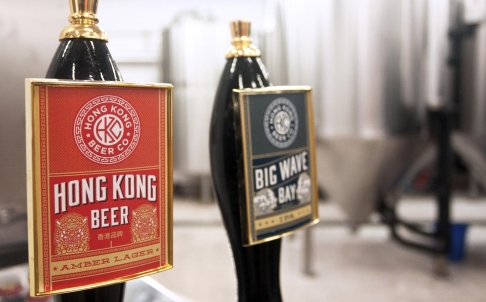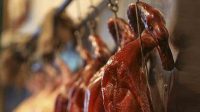Just two years ago if you asked your neighbourhood publican for a Hong Kong brew, they most likely would have shrugged and steered you towards an import instead. Or if they had scrounged up a locally produced beer, you would probably have wished they hadn't. How the times have changed. Hong Kong is a little late to the party, but local craft beers are starting to take off.
Not only are the city's mushrooming specialist pubs proudly serving a selection of made-in-Hong Kong beers, local craft operations are producing microbrews that can stand up to the hottest labels from the US and Europe.
The leader of the pack is arguably Hong Kong Beer Company, which is coming into its own under new ownership.
Established in 1995 as the South China Brewing Company, it used to be known more for producing lacklustre brews. A name change in 2003 did nothing to improve its reputation until the brewery was sold this year to Devin Kimble and Daniel Flores, founders of Brewerkz Restaurant & Microbrewery in Singapore.
Under the pair's direction the only thing that remained of the old company was its name. Everything else, from ingredients and equipment to labels, got an upgrade. They moved the brewery to a new space in Chai Wan and brought in Simon Pesch, a brewmaster formerly at Pyramid Breweries in California. Today the operation is run by just three people: Kimble, Pesch and brewer Ferdie Pingol, who has been with Hong Kong Beer since before the takeover.
The company officially relaunched in March at Beertopia, the city's biggest beer-focused event to an appreciative crowd of drinkers.
"We were really surprised how supportive Hongkongers are and how excited they were about having a craft beer to call their own," says Kimble, "It's not really like that in Singapore."
Hong Kong Beer Company makes fairly traditional but carefully constructed brews with a focus on balance and purity of flavour, and labels that reflect their roots such as Dragon's Back Pale Ale and Big Wave Bay IPA (India pale ale). Demand has grown enormously. They are now producing 5,000 barrels, or 600,000 litres, annually, and have ordered additional equipment to double capacity to 10,000 barrels a year to meet the growing thirst.
The company now supplies to more than 100 outlets in the city and hopes to expand into other Asian markets.
Hong Kong's burgeoning craft brew scene has come as a kind of boozy Cambrian explosion, rather than being catalysed by the turnaround in pioneers such as Hong Kong Beer Company. The first microbreweries popped up just as specialist bars became a hot trend; Hong Kong drinkers seemed to develop a sudden and deep thirst for craft beer.
Among three major microbrewers to emerge in the past year, Young Master Ales seems to be the name on most beer lovers' lips.
It's the brainchild of Rohit Dugar, an ex-banker who launched his microbrewery out of a warehouse space in Ap Lei Chau earlier this year.
Arriving from New York three years ago, Dugar says he was "shocked to find no good beer or local brewery operating in town".
He found the only way to drink good local beer was to brew his own at home, which he did. Over time he learned that he wasn't alone. "People are simply fed up with poor quality industrially made products force-fed to them by large companies." That influences how Dugar runs Young Master Ales. It makes fairly small batches - only 15,000 litres of beer a month - and all the stock is usually sold within weeks. Its flavours show a deep sense of place, using Asian ingredients like soba (buckwheat) to create beers that are proudly Hong Kong in execution.
"Beer is a whole lot of fun, but we taking the process of making it very seriously," Dugar says. A fanatic about ingredients, Dugar only makes beers that are all natural - "unfiltered, unpasteurised and naturally carbonated and use the highest quality ingredients we can find."
Young Master prides itself on being willing to push the envelope. This may put off some traditionalists but Dugar couldn't care less.
"The notion of a 'local palate' is one we wholeheartedly dismiss. For us, information on consumer tastes is irrelevant to what we are trying to do. We don't design beers based on what people enjoyed in the past," he says. "If we did so, we would never introduce anything meaningfully new."
This approach seems to be working so far: Young Master is carried at 25 craft beer pubs and stores and they expect to reach brewing capacity later this month.
The smallest of the homegrown craft brewers, Moonzen Brewery, is also the most unorthodox. Mexican engineer Laszlo Raphael and his wife Michele started the operation this year after relocating here.
Raphael was working an operational engineer in the oil fields of North Africa until the expanding turmoil of the Arab Spring prompted him to leave. "Something wasn't right about this camel ride," he says.
"I became thirsty for greater purpose and self-expression. This thirst literally led me to start my own brewery."
Raphael is no dilettante: his father was a brewer, and although he had no interest in brewing as a child, beer later became an obsession and he has been brewing at home for more than 10 years.
Moonzen is built on a concept which Raphael refers to as "beer goodness", a holistic approach to brewing and beer drinking that takes into account health, social responsibility and sustainability.
"It's a mindful kind of consumption," he says.
Giving his take on the crop of craft brewers, Raphael says: "Hong Kong Beer Company is much more large scale, industrial-sized company backed by a large group. Their aim is to be the LKF of beers. For Young Master, their beers are more elegant, more craft, not industrially produced and they're looking to be in finer establishments like hotels and restaurants. We care a lot about the community. We want to be a local brewery and not in an expat way."
Like Young Master, Moonzen makes beers that are unpasteurised and naturally carbonated, with no preservatives or stabilisers. It is essentially a one-man operation; Raphael handles all the day-to-day tasks from "brewing, to fixing, to cleaning, and delivering", while his wife, who works at an NGO, helps with the finances and marketing.
They produce just 2,000 bottles a month but are already making a mark. Their signature Thundergod Ale, a pale ale with notes of tropical fruit and citrus, has already won two awards - Best Pale Ale and Best Hong Kong Produced Beer - at the 2014 Hong Kong International Beer Awards.
Thundergod is relatively hard to find compared with other craft brews, but drinkers keen for a taste can find it in the Mandarin Oriental.
They also produce an IPA, an amber ale, a porter, and a stout using vanilla and chocolate, and have a special arrangement with the Pawn in Wan Chai to create a series of British-style beers.
As admirable as Moonzen's standard brews are, it takes a sampling of their seasonal offerings to get an idea of Raphael's off-the-wall brewing style and his ethos that "to be a truly Hong Kong brewery you have to incorporate Hong Kong ingredients". A prime example is his Belgian ale made with manuka honey and Chinese green tea, which he claims sells like "hot pancakes".
Hong Kong's craft beer movement is largely defined by three microbrewers at the moment, but all believe others will be piling in before long.
"I believe we have all the pieces of the craft beer puzzle working together at the same time in Hong Kong" Dugar says. "We have high quality and fresh locally brewed beer; home brewing has taken root as a hobby, importers are bringing in better beer, and we have dedicated, craft-focused beer festivals."
Raphael adds: "Compared to red wine for example, craft beer is a luxury that more people can afford."
They would enjoy a little healthy competition, too.
"We don't view other craft breweries as competitors. We are all trying to show beer drinkers that there is more to beer than industrial, light lagers," Kimble says.
"Craft beer - locally produced and imported - is probably about 1 per cent of total beer sales [in Hong Kong]. In some cities in the US, craft beer gets 40 per cent of the market. There is so much room for craft beer to grow in Hong Kong."
Dugar agrees: "If new microbreweries maintain high standards, we see that as helping further development of the scene. One of the most exciting things is that there is space for everyone."



